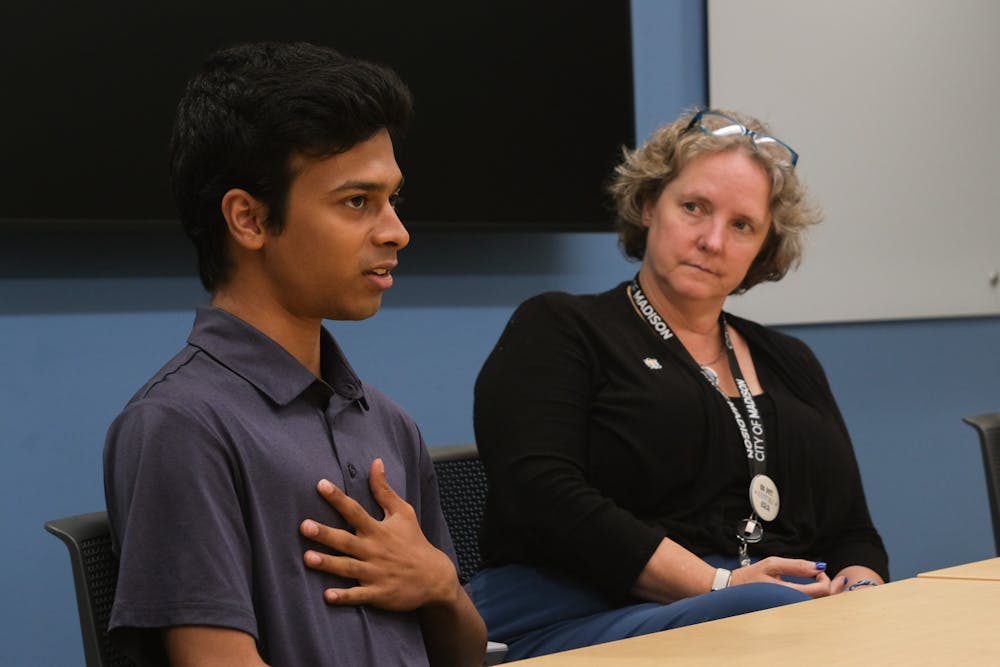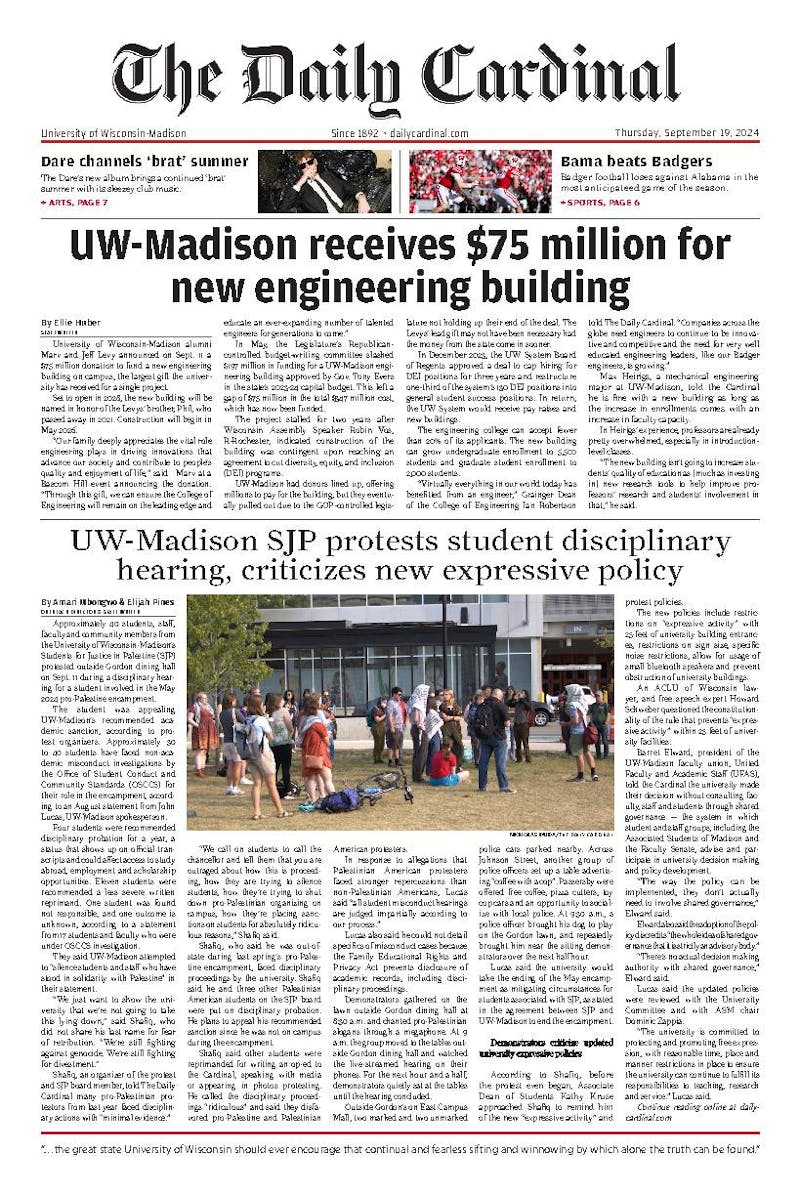Madison Mayor Satya Rhodes-Conway hosted a roundtable meeting Thursday with student journalists from the University of Wisconsin-Madison to discuss key issues surrounding student housing, the new Bus Rapid Transit system, the city budget, campus safety and the upcoming November election.
District 8 Ald. MGR Govindarajan and City Communications Manager Dylan Brogan helped facilitate the meeting.
Addressing student housing concerns
For the past several years, the struggle to find affordable and accessible housing in downtown Madison has been a growing complaint for many students.
While UW-Madison’s total enrollment broke 50,000 students for the first time in its history last year, construction of new housing accommodations seems to be dominated by luxury apartments like the Oliv.
Prices of existing apartments are also rising. Rent for UW-Madison students averages $1,273 per bed, according to a recent student housing report conducted by the city and the university.
Govindarajan said both the city and the Associated Students of Madison are taking measures to address affordable housing. But as far as regulatory changes are concerned, he and Mayor Rhodes-Conway said their hands are tied — in no small part by the Republican-controlled state legislature.
State restrictions on local governments have been a historical issue in the state. Wisconsin local governments are barred from creating regulations for themselves on a number of policy points, from most tenant protections to raising property tax beyond a certain limit.
The city of Madison also cannot impose inclusionary zoning and affordability requirements on proposed new housing developments, leaving only positive incentives to offer developers such as an ordinance passed last year allowing new housing projects to exceed city height limits in exchange for the inclusion of affordable units.
“We had inclusionary zoning requiring developers to build affordable housing when they built a new job,” Rhodes-Conway said. “We got sued. We lost. We can't do it anymore.”
Rhodes-Conway also said the city understands students' difficulties in dealing with a leasing season that begins each fall, soon after classes start.
“I got an email today from a student's mother who said it's ludicrous that my kid is having to figure out where they’re going to live next year now, and you know what? She's absolutely right,” Rhodes-Conway said.
The city once had an ordinance that prevented landlords showing units for rent until at least one quarter of the current tenant’s lease had passed, but it was preempted by the state Legislature, Rhodes-Conway said.
“Every single one of our tenant protections that we had in the Madison city ordinances has been preempted by the state legislature,” Rhodes-Conway said. “If we could, we would absolutely do more to protect tenants… and we know we are collectively not doing enough.”
While new luxury apartments may not appear like a solution, Rhodes-Conway and Govindarajan said they are partnering with the properties to work around the Legislature through new student-focused zoning reforms and secure affordable housing for those who need it.
“Madison is the first place in the country that we know of that has partnered with the University and developers [to incentivize affordable units],” Govindarajan said.
Updates to public transit
Through federal funds in the capital budget from the federal Bipartisan Infrastructure Law, Madison has been able to push infrastructure improvements like the new Bus Rapid Transit (BRT) system.
The BRT system may even pay for itself by ameliorating delays, crowding and allowing fewer drivers to move more people, Rhodes-Conway said.
“It turns out that the majority of the cost of operating a transit system is the driver, and so the cost to run the east-west route a BRT line is not any more than what we were doing before,” Rhodes-Conway said. “In fact, once it all gets up and running, it's going to be fewer drivers. So we might actually save a little bit of money on it.”
The bus will also connect campus to commercial centres outside of downtown Madison.
“[Before the BRT] to go to West Towne Mall, it would be about a 50-minute bus ride if the weather is good,” Govindarajan said. “Now with BRT, you could probably get there in 25 minutes and just sit down. It’s a one-seat ride. There's a lot of places that are going to be a lot easier to get to.”
Encouraging students to vote
Rhodes-Conway emphasized the importance of the upcoming referendum that would allow the city to raise property taxes to close its $22 million budget deficit, which if left untreated would lead to massive cuts in essential city services in the coming years. She said the city has a six-year plan to balance the budget if the referendum passes.
“If we can pass the referendum in November, we will be able to balance our budget for another five years, and that will give us time to work with the state Legislature and get some changes,” Rhodes-Conway said.
According to the Mayor’s Office, the referendum is only necessary because of strict state restrictions and relatively little shared revenue. Madison receives $29 per resident from the state — the least of all cities in the state — while most Wisconsin cities receive $195 per resident.
If the referendum passes, property taxes will increase by roughly $5 per month for every $100,000 of property value, or $219 annually for the average homeowner. The amount passed onto renters would likely be much less than that, according to Rhodes-Conway.
Rhodes-Conway, Govindarajan and Brogan said the city is committed to promoting civic engagement and helping as many students vote as possible by collaborating with BadgersVote to make registration easy to navigate.
“We really encourage people to use early voting,” Rhodes-Conway said. “Both because the lines are likely to be shorter and because if something comes up on the day, or it's raining, or you have an exam, or you're out of town or whatever it might be, you don't want to leave it until the last moment.”
Additionally, Brogan invited students to learn more about the upcoming referendum, no matter how they choose to vote on it, while Govindarajan reminded students how important their voices can be in making change.
“We are such a huge portion of Madison's population that we can really explain how things go,” he said.
Absentee ballots in Madison can be requested online and either mailed in or dropped off in person at one of the several downtown locations.
Alex Tan is a staff writer for the Daily Cardinal specializing in state politics coverage. Follow him on Twitter at @dxvilsavocado.






